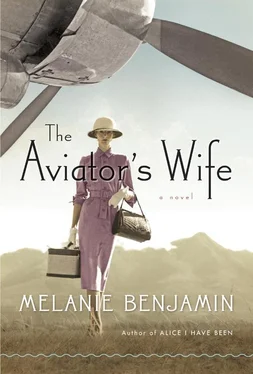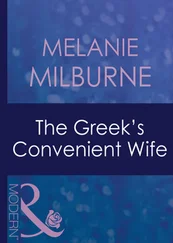“What an honor! Elisabeth, are you quite sure? Anne?”
“Of course!” Elisabeth laughed and tossed back her head. “I can’t imagine anyone I’d rather have take me up for my first flight!”
“I’m not—I’ll think about it,” I mumbled, wishing that all eyes weren’t still on me; knowing that were I to go up in his plane, even more eyes would be watching: newspapermen, photographers, newsreel cameras.
To my relief, the music started up again—songs from Show Boat , the most popular show of the year—and instantly the entire attitude of the room relaxed. Waiters were busy running to and fro with trays of cocktails—there was no Prohibition in Mexico!—and people were beginning to pair up and dance. Dwight pulled me off the sofa, squeaking, “Come, Anne—let’s do a Virginia reel! I’ll get them to play one, just like we used to.” And I, too, was out on the dance floor, linking arms with my brother and cousins as we flew about to a Mexican trumpet attempting to warble its way through “Arkansas Traveler.”
I loved dancing! I loved the freedom, the silliness of the Shimmy, the absolute joy of the Charleston; for some reason I could lose myself to the music and the rhythm in a way I couldn’t lose myself otherwise. The more crowded the dance floor, the more fun I had, and soon Dwight and I were bumping into bodies, tripping over feet, but we didn’t care. We used to perform this silly little dance at birthday parties when we were young; Elisabeth would pound the piano, playing some Stephen Foster song, and Mother and Daddy, seated side by side on the sofa, with Con on Mother’s lap, would laugh and applaud as if they’d never seen us before.
But it had been ages since the last time we’d danced like this; ages in which we had both grown up, gone to school, attempted to leave behind our childish ways. I flashed a grateful smile at my brother for giving me this gift of a self I had just recently begun to mourn. And for helping me imagine, if only for an instant, that we were all back home in New Jersey.
Only for an instant. I was in the middle of a turn, one arm linked in my brother’s, the other arm holding up my skirt, when I caught Colonel Lindbergh watching me. He wasn’t smiling; he was studying me, a faint frown creasing his forehead. Even from all that way across the room, I felt the weight of his obvious disapproval. Of course, I was being ridiculous! A girl my age, dancing a child’s dance, when he, not so much older, had crossed an entire ocean!
Suddenly my face was so hot I felt as if an aura, like the sun, was encircling my head; dropping my brother’s arm, I whispered, “Oh, Dwight, how silly we are! We’re not so little anymore; we’re not children.”
“So what, Anne? We’re just having fun!”
Just then my cousin Dickie threw a black lace doily on my head, like a mantilla, and stuck a rose in my hair; pulling me by the arm he dragged me in front of Colonel Lindbergh.
“Doesn’t Anne look like a señorita, Colonel?” He laughed. For a moment, I felt like a señorita in my red dress, flushed skin; I had a fragmentary glimpse of my hair in a mirror, dark and shining with that red rose against it, and I tilted my chin to meet my gay reflection, smiling.
But in that mirror I saw the colonel sitting there, watching me. He looked uncomfortable, as if his shirt collar was too tight; when our gazes met, he turned away, frowning.
“Oh, Dickie!” I pulled the flower out and threw it to the floor. “How silly!” And then I stumbled off, leaving them all to laugh at me. It was absurd, carrying on like that—what was I thinking? Embarrassed tears filled my eyes, and I pushed through the crowd, ignoring a matron who peered, fish-eyed, at me through a crystal wineglass and intoned, “Goodness, I’ve never seen a face so scarlet!”
Was it? I pressed my hand to my cheek as I fled; it was like touching an oven door. Finally finding myself in an empty hall, I ran as far away from the reception room as I could until I discovered a back staircase. Stumbling up the stairs to the second floor, I wildly bounced from hall to hall, room to room, like a billiard ball. I was so lost as to be truly frightened. All the doors looked exactly the same. How on earth would I find mine? Oh, I wished I was back home! And that I had never met Colonel Lindbergh, so smug, so arrogant—yes, that was it! His arrogance as he stared at me, as if he were God or Calvin Coolidge himself, sitting so stiffly on that sofa—“I don’t dance,” he’d told Mother, and immediately made everyone else in the room feel silly for wanting to. How dare he?
My heart was a furnace, fueled by my anger. Stopping to fan myself with the doily, which somehow had clung to my head through my mad dash, I found myself in front of a mirror with a cracked silver frame. The same mirror that I had consulted to make sure my nose wasn’t shiny when I left my room earlier this evening. With a hysterical little hiccup, I pushed open a door that revealed my familiar red wool slippers laid out next to a four-poster bed, the flowered kimono I used as a dressing gown spread out on the coverlet.
Once inside, I flung myself down on the bed, dry-eyed. But now my anger was gone, leaving room for the familiar, heavy weight of uncertainty and guilt. Had I hurt Dwight by leaving him in the middle of the dance floor? Had I made a spectacle of myself, running from the room? But as time went by and no one knocked on my door, and still I heard the gay sounds of the party below—the music, the tinkling of glass, the sudden bursts of laughter—I realized that I hadn’t. No one was going to come looking for me, after all—and I wasn’t entirely sure how I felt about that.
I was sitting on the edge of my bed, calm now, my cheeks no longer burning, my skin no longer plastered to that awful rubber brassiere, when I heard footsteps pause outside my door. An envelope was thrust beneath it, and then the footsteps went, rather hurriedly, away.
Thinking it was a message from Dwight or Con, I ran to pick it up. It wasn’t from either; I could tell that from the lack of inkblots and thumbprints on the envelope. My name was written very neatly in a foreign hand: the precise, measured handwriting one would expect from a military man.
Or an aviator.
I felt a rush of excitement pummel me, punching my heart into high gear, buckling my knees. But I wouldn’t allow myself to open it.
When I was a little girl, I had pleased my father most by being the child who could make a lollipop last the longest, who never asked for an advance on her allowance. “Anne’s the disciplined one,” he always bragged to his friends. It was the only characteristic I had of note. And like any person with only one talent, I cherished and guarded it. I no longer knew what it was to sneak a cookie before dinner, or buy a new frock just because.
I placed the envelope on the bed, then began my nightly ritual of slipping out of my dress, my step-ins, unsnapping my garters, rolling my stockings down, unbinding my chest, folding my lingerie and placing it all in a little silk bag hanging from the doorknob. I chose, after a long moment of grave contemplation, a long-sleeved pink lisle nightgown from a cupboard, where all my clothes, miraculously brushed and pressed by one of those fourteen servants, were now hanging. Sitting down at my dressing table, I unpinned my long brown hair and brushed it one hundred times, the brush occasionally getting caught in my wiry tangles, tugging my scalp until my eyes watered. And even though, all this time, I could see the white envelope waiting on the bright red coverlet of my bed, like an unopened Christmas present, I still took the time to smooth some Ponds Night Cream carefully on my forehead and cheeks, with a few extra pats for my throat.
Читать дальше












